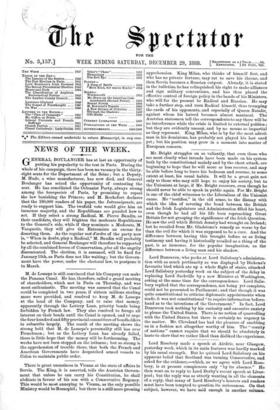Mr. Bright struggles on so valiantly, that even those who
see most clearly what inroads have been made on his system both by the constitutional malady and by the chest attack, are beginning to hope that he will more or less recover, and may be able before long to leave his bedroom and resume, to some extent at least, his usual habits. It will be a great gain not only to those who may still hope to enjoy his society, but to the Unionists at large, if Mr. Bright recovers, even though he should never be able to speak in public again. For Mr. Bright is one of the chief witnesses to the Liberalism of the Unionist cause. He "testifies," in the old sense, to the dismay with which the idea of severing the bond between the British and the Irish Legislature and Administration filled his heart, even though he had all his life been reproaching Great Britain for not grasping the significance of the Irish Question. He saw the evil which British density had wrought on Ireland; but he recoiled from Mr. Gladstone's remedy as worse by far than the evil for which it was supposed to be a cure. And the difference between having this brought before us as living testimony and having it historically recalled as a thing of the past, is as immense, for the popular imagination, as the difference between a living man and his shadow.


































